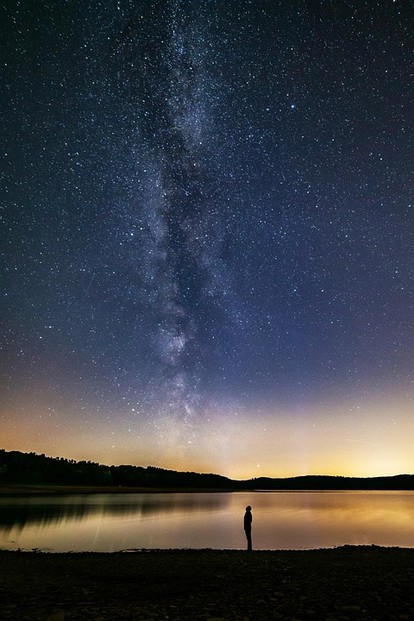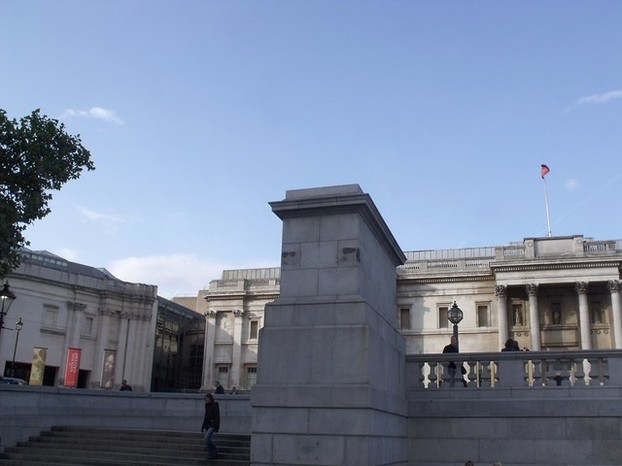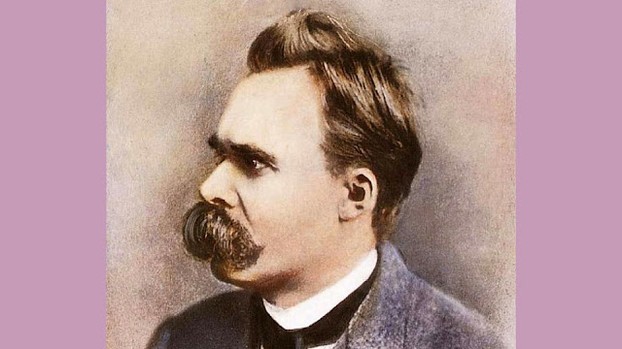In times of uncertainty and dysfunction, the notion that nothing is real and all values are baseless has a certain appeal. This leads to the proposition that existing structures have failed and should, therefore, be torn down and replaced by “something else.” However, that “something else” is rarely defined and isn't the idea of destroying everything a concept that defies the essence of nihilism?

The Bleakness of Nihilism
by RupertTaylor
A philosophy that draws its breath from the Latin word nihil, meaning nothing.
 The emptiness of nihilism. |
Caveat
Nihilism is a complex philosophy and this article makes no claim to being an exhaustive study of the topic. For those who wish to study the subject further there are sources listed at the end.
The Birth of Nihilism
As with almost all matters philosophical, we have to go back to Ancient Greece to find the roots of nihilism. Four hundred years before the beginning of the Common Era, Pyrrho of Elis is credited with starting the school of Skeptics. They argued “that because human perception and reasoning are fallible, it is difficult to achieve absolute certainty about anything” (studysmarter.co.uk).
Other philosophers took this idea forward and embellished it until we arrive in Europe late in the 18th century and what has become known as the Enlightenment. People such as the American political activist Thomas Paine questioned the idea that all knowledge was revealed to humans by God. Others suggested that God might not exist at all.
If there is no divine being in whom we can believe, how can we know what is real? The German philosopher Friedrich Jacobi (1743–1819) had the answer to that question—nothing. He called it “nihilismus” and it was the opening kick off for the philosophy we call nihilism. However, it's fellow German philosopher Friedrich Nietzsche (1844-1900) who is much more closely associated with nihilism.
Nietzsche is often cast as the villain in the philosophy play because, in 1882, he wrote that “Gott ist tot” (God is dead). That created a stir as it seemed the philosopher was denigrating the very foundation of morality.
Nietzsche expert Dr. Jamie Parr explains (The Conversation) that “Without God, we are alone, exposed to a natural universe devoid of the comforting idea of a God-given purpose to things. According to Nietzsche, this state of nihilism—the idea that life has no meaning or value—cannot be avoided; we must go through it, as frightening and lonely as that will be.”
Nihilism says there is no grand plan ordained by a deity; there is nothing to believe in and, therefore, there is no meaning to anything. Everything just is and there is no point to ascribing purpose to events.
Types of Nihilism
Nihilism comes in several flavours, none of which are very appealing:
Alethic nihilism says that nothing is true. That is obviously absurd. It is indisputably true that the African elephant is currently the largest land mammal on Earth. This is proved by measuring the animal and comparing it all other animals. However, social media has become a place where “nothing is true.” People are prone to making outrageous and false statements (elephants are insects?) and other people will believe them. But, alethic nihilism contains within it a self-defeating conundrum; if “nothing is true” then the statement that “nothing is true” cannot itself be true.
Existential nihilists believe that life is without purpose or meaning. The author and self-styled “philosophical entertainer” Alan Watts put it this way: “Life is nothing more than a trip from the maternity ward to the crematorium.”
Writing for thecollector.com, Rosie Lesso tells us that “Cosmic nihilists noted how the universe is completely indifferent to our daily lives, thus reinforcing the argument that nothing we do matters at all, so why bother believing in anything or anyone? Some even went a stage further, arguing that the things like love, family, freedom, and happiness we hold on to so tightly are merely distractions to divert us away from the underlying truth that we are all just waiting to die.”
 Cosmic nihilism says that in the context of the universe humans are of absolutely no significance. |
Ethical nihilism posits that concepts such as good and evil are false constructs created by humans. Nihilists say there is no such thing as free will, therefore individuals cannot be lauded for doing good, nor can they be condemned for doing evil. Each of us is responsible for judging our own morality rather submitting to dictates of an outside authority such as government or religion.
The Internet Encyclopedia of Philosophy says that epistemological nihilism “is currently identified with postmodern antifoundationalism;” a phrase that is not terribly helpful to ordinary folk. So, let's see if there isn't a simpler explanation. Happily, thoughtlogy.com is up to the challenge: “Epistemological nihilism is the idea that we can't know anything for sure. It questions whether we can truly understand or justify any beliefs about the world.”
To understand political nihilism we need look no further than the far right-wing of the Republican Party in the United States. Their mantra is that “government is the problem” and needs to be removed root and branch. Once again, Rosie Lesso sheds some light: This group wants to tear “down all pre-existing institutions that try to dictate how we live out our lives, including religion, political institutions and even social clubs and organizations.”
Finally, we come to aesthetic nihilism, which says that beauty and art are based entirely on personal opinion and, therefore, have no inherent universal or real value. Here is maycontainphilosophy.com to explain that “Aesthetic nihilism is not about despair but about freedom—freedom from the need to explain or justify beauty. This perspective allows creators to explore chaos, emptiness, and absurdity without restraint.”
And, here we have Salvatore Garau encapsulating the entire concept of nihilism in his “art.” In 2021, he sold his creation “Io Sono” (Italian for “I am”) for $18,300. He described the medium in which he “worked” as immaterial. He says it's a piece of sculpture, but we'll have to take his word for it because it's invisible. It doesn't have a physical form; it's a piece of sculpted air, or unicorn farts, your choice. It's nothing—the essence of nihilism.
 Io Sono displays the breathtaking skill of the sculptor of nothing. |
Bonus Factoids
- Bertrand Russell (1872-1970) was a British philosopher who observed that “The point of philosophy is to start with something so simple as to not seem worth stating, and to end with something so paradoxical that no one will believe it.”
- In a list of quotes about nihilism one stands out for it's clear-sighted wisdom on the subject: “Nihilism then goes on to define the postmodern condition as characterized by a rejection both of these meta-narratives and of the process of legitimation by meta-narratives.” Yup.
- 1969 was a year of turmoil—The Viet Nam War and protests, civil unrest in Northern Ireland, Woodstock, Stonewall riots, and other disruptions. It was also the year that Peggy Lee released her hit song, Is That All There Is, which can be seen as an anthem to nihilism.
Sources
-
“Greek Philosophical Skepticism.” Lily Hulatt, studysmarter.co.uk, undated.
- “Explainer: Nietzsche, Nihilism and Reasons to Be Cheerful.” Jamie Parr, The Conversation, February 24, 2020.
- “This Essay Isn’t True.” David Liggins, Aeon, November 17, 2022.
- “Understanding Meaninglessness: The 5 Theories of Nihilism?” Rosie Lesso, thecollector.com, August 3, 2022.
- “Ethical Nihilism.” allaboutphilosophy.org, undated.
- “Nihilism.” Alan Pratt, Internet Encyclopedia of Philosophy, undated.
- “What Are the Different Types of Nihilism?” thoughtlogy.com, July 27, 2024.
- “Aesthetic Nihilism: Finding Beauty in a Meaningless World.” maycontainphilosophy.com, undated.
© Copyright Rupert Taylor 2025.
You might also like
Philosophy for Gardeners: a reviewPhilosophy for gardeners is a unique and enjoyable book well worth reading ...
What is happening when we readReading involves sharing the author's values and experiences and making them ...




 The Double Life of Charles Kuralt2 days ago
The Double Life of Charles Kuralt2 days ago
 The Legend of Gustave the Man-Eating Crocodile3 days ago
The Legend of Gustave the Man-Eating Crocodile3 days ago
 American Cop Shakedownon 09/16/2014
American Cop Shakedownon 09/16/2014
 How Stores Manipulate Customerson 07/16/2014
How Stores Manipulate Customerson 07/16/2014


Comments